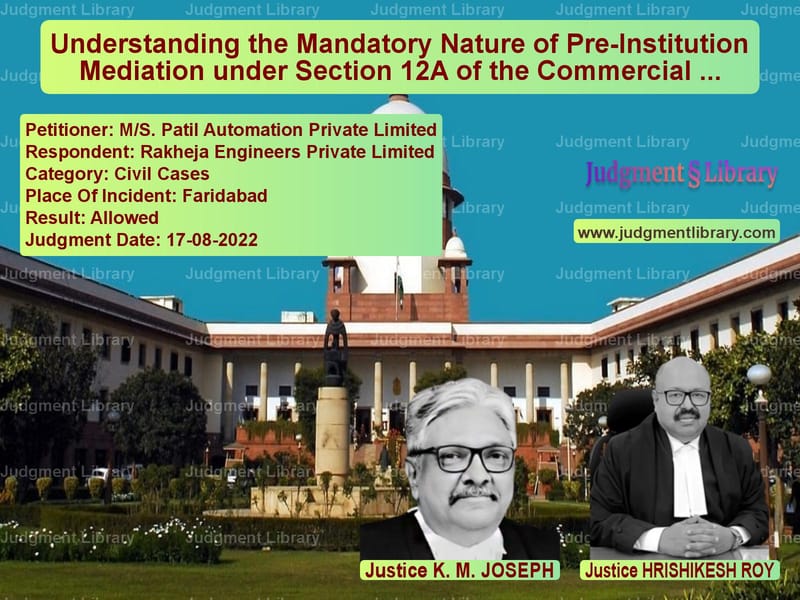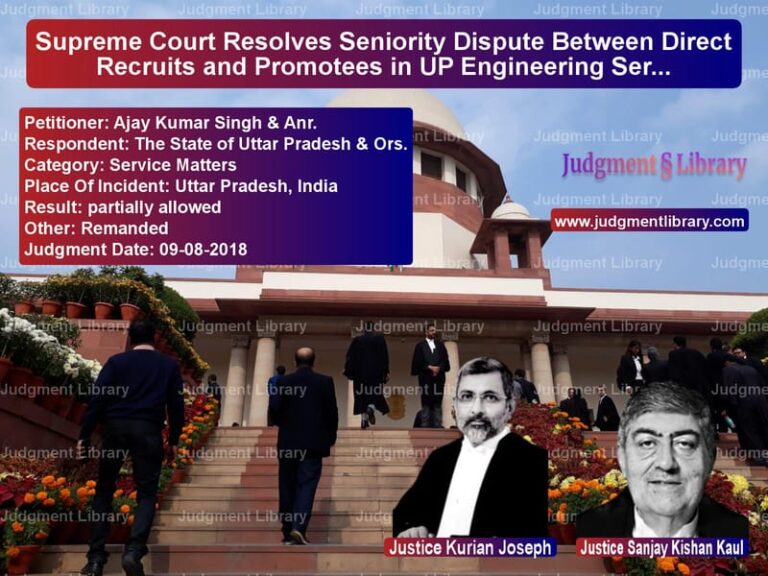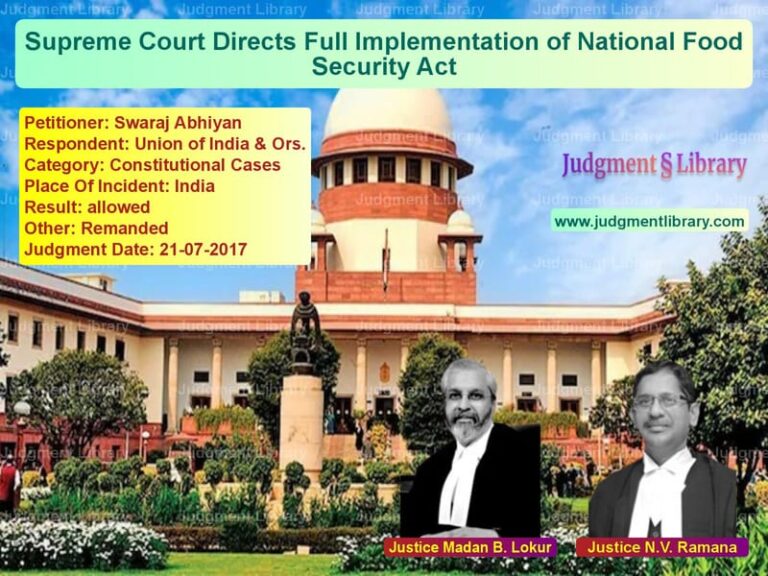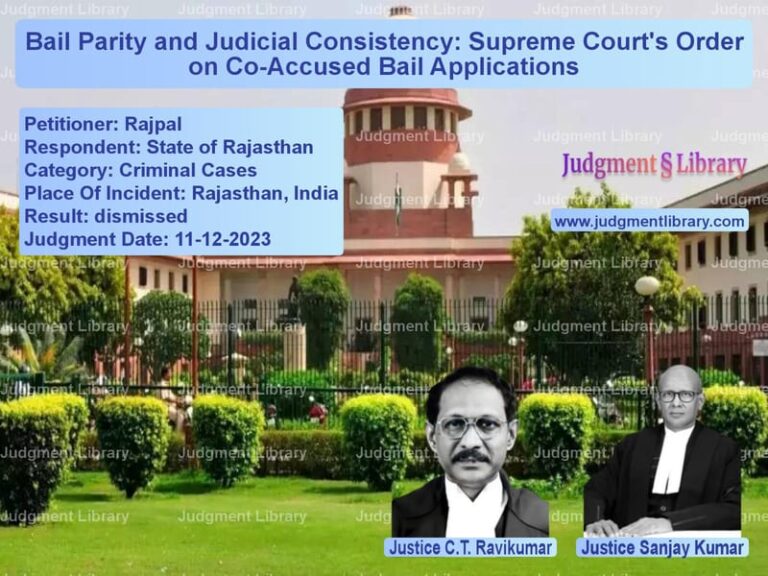Understanding the Mandatory Nature of Pre-Institution Mediation under Section 12A of the Commercial Courts Act
The Supreme Court of India, in its judgment dated August 17, 2022, addressed the significant question of whether the statutory pre-litigation mediation mandated under Section 12A of the Commercial Courts Act, 2015, is compulsory or not. The judgment came in response to appeals involving M/s. Patil Automation Private Limited and Rakheja Engineers Private Limited, where the appellants contested the rejection of their suits on the grounds of non-compliance with Section 12A. This blog explores the core issues, legal arguments, and the Supreme Court’s ruling that Section 12A is a mandatory provision.
Background of the Case
In these appeals, M/s. Patil Automation filed a suit for the recovery of a debt without resorting to pre-litigation mediation, as required by Section 12A of the Commercial Courts Act. The defendant, Rakheja Engineers, filed an application under Order VII Rule 11 of the Civil Procedure Code (CPC), seeking to have the plaint rejected on the grounds of non-compliance with Section 12A. The central issue was whether the mandatory pre-litigation mediation process must be followed before filing a commercial suit, especially when no urgent interim relief is sought.
Read also: https://judgmentlibrary.com/supreme-court-modifies-refund-order-in-nagpur-real-estate-dispute/
The Petitioner’s Arguments
The petitioners, represented by Senior Counsel Shri Sanjeev Anand, argued that the word ‘shall’ used in Section 12A of the Commercial Courts Act indicated that the pre-litigation mediation process was mandatory. The petitioners contended that any suit filed without first attempting pre-litigation mediation must be rejected under Order VII Rule 11 of the CPC. They cited the Statement of Objects and Reasons of the 2018 amendment to the Commercial Courts Act, which introduced Section 12A, to argue that the intention of the legislation was to de-clog the courts by resolving commercial disputes early, through mediation.
The petitioners also contended that while the mediation process is not without exceptions, the requirement of pre-institution mediation should not be taken lightly. They emphasized that Section 12A aims to reduce the burden on commercial courts by encouraging amicable dispute resolution before litigation ensues, which would ultimately contribute to the ease of doing business in India.
The Respondent’s Arguments
The respondents, represented by Shri Saket Sikri, countered that Section 12A was merely a procedural provision and should not be construed as mandatory. They argued that the word ‘shall’ in Section 12A did not necessarily make the pre-litigation mediation mandatory, as no penal consequences were specified for non-compliance. They further contended that the failure to follow the procedure should not result in the rejection of the plaint, especially when no urgent interim relief was sought in the suit. The respondents argued that the courts had discretion to allow the suit to proceed, particularly when no harm was caused to the defendant, as the mediation process could still be undertaken during the pendency of the suit.
Additionally, the respondents pointed out that requiring compliance with Section 12A before filing a suit would create unnecessary procedural hurdles, especially in cases where mediation could still be attempted after the suit had been filed. They also cited case law that interpreted procedural rules as directory rather than mandatory, advocating for flexibility in applying Section 12A.
The Court’s Analysis
The Supreme Court, in its analysis, focused on the interpretation of Section 12A, particularly the use of the word ‘shall’. The Court referred to the legal principle that while the word ‘shall’ is typically interpreted as mandatory, its mandatory nature can be examined in the context of the object of the legislation. The Court also noted that Section 12A aimed to de-clog the courts and promote efficient dispute resolution by encouraging mediation in commercial disputes.
The Court acknowledged that while there is no explicit penalty for non-compliance with Section 12A, the legislative intent behind its introduction was to ensure that parties first attempt mediation before proceeding with litigation. The Court emphasized that the purpose of Section 12A was to reduce the burden on the judiciary and to resolve commercial disputes without resorting to the adversarial court process, thus promoting a more efficient justice delivery system.
The Judgment
The Supreme Court ruled that Section 12A of the Commercial Courts Act is indeed a mandatory provision. The Court held that the statutory requirement for pre-litigation mediation must be complied with before filing a commercial suit that does not seek urgent interim relief. The Court rejected the argument that the word ‘shall’ was directory, emphasizing that the failure to follow the procedure under Section 12A would result in the rejection of the plaint under Order VII Rule 11 of the CPC.
The Court also clarified that if a plaint is rejected for non-compliance with Section 12A, the plaintiff can still file a fresh suit after complying with the pre-litigation mediation requirement. However, the fresh suit must be filed within the prescribed limitation period, with the time spent in pre-litigation mediation not counted for the purpose of the Limitation Act. The Court further stated that mediation should not be seen as an obstacle to accessing justice but as an alternative means of resolving disputes efficiently and amicably.
Conclusion
This ruling marks a significant step in the evolution of the Commercial Courts Act, highlighting the mandatory nature of pre-litigation mediation in commercial disputes. The Court’s decision reinforces the idea that statutory mediation is crucial for reducing the workload of courts and promoting the resolution of disputes through amicable means. While the Court’s interpretation of Section 12A may have significant procedural implications, it ultimately aims to streamline the litigation process and enhance the ease of doing business in India. The judgment underscores the importance of mediation as an essential tool for resolving commercial disputes swiftly and effectively.
Petitioner Name: M/S. Patil Automation Private Limited.Respondent Name: Rakheja Engineers Private Limited.Judgment By: Justice K. M. JOSEPH, Justice HRISHIKESH ROY.Place Of Incident: Faridabad.Judgment Date: 17-08-2022.
Don’t miss out on the full details! Download the complete judgment in PDF format below and gain valuable insights instantly!
Download Judgment: ms.-patil-automatio-vs-rakheja-engineers-pr-supreme-court-of-india-judgment-dated-17-08-2022.pdf
Directly Download Judgment: Directly download this Judgment
See all petitions in Contract Disputes
See all petitions in Consumer Rights
See all petitions in Debt Recovery
See all petitions in Specific Performance
See all petitions in Damages and Compensation
See all petitions in Judgment by K. M. Joseph
See all petitions in Judgment by Hrishikesh Roy
See all petitions in allowed
See all petitions in supreme court of India judgments August 2022
See all petitions in 2022 judgments
See all posts in Civil Cases Category
See all allowed petitions in Civil Cases Category
See all Dismissed petitions in Civil Cases Category
See all partially allowed petitions in Civil Cases Category







